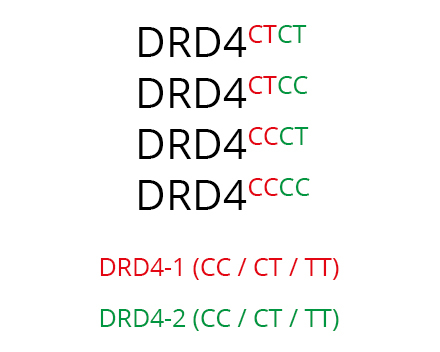DRD4
Dopamine receptor D4 gene
DRD4 gene DRD4-Bst4Cl/DRD4-1/ g.129954C>T and DRD4-MnlI/DRD4-2/g.129456C>T
| Required genotypes | |
|---|---|
| DRD4CTCT | The genotype that by far leads to the best performance |
| DRD4CTCC | Significant positive effects on flights up to 600 km |
| DRD4CCCT | Significant positive effects on long-distance performance |
| DRD4CCCC | No significant positive effect on performance of racing pigeons |
| For the other variants (CCTT, TTCC, TTT), no significant differences could be demonstrated to date, as these occur extremely rarely in the racing pigeon population. However, there are indications that these effects will be proven later. Moreover, the latter three genotypes are extremely interesting for breeding purposes, as they definitely inherit the T allele for DRD4-1 and/or DRD4-2. |
Two point mutations are tested together on the DRD4 gene; DRD4-Bst4Cl/DRD4-1/ g.129954C>T and DRD4-MnlI/DRD4-2/g.129456C>T. The combined genotype of both loci is expressed as follows: the first 2 letters (CC, CT, TT) refer to the genotype DRD4-1 and the following 2 letters (CC, CT, TT) refer to the genotype DRD4-2.
The DRD4CTCT variant is significantly more present in the best performing pigeons. Most double heterozygotes (CTCT individuals) were found among the best performing pigeons on extremely long distance flights.
Dopamine is a so-called neurotransmitter. Many important physiological functions are mediated by dopamine. To perform its tasks, dopamine binds to dopamine receptors. In the brain, dopamine receptors D1-5 are found. This marker would therefore mainly affect the behaviour of pigeons. The exact mechanism of the performance-enhancing effect of the point mutations in the DRD4 gene will have to be investigated further.
- DRD4-1: probable impact on orientation and initiative. Strong positive effect in races up to 600 km.
- DRD4-2: probable impact on character and perseverance. Long distances.
How often does this allele occur in our population of racing pigeons?
The figures are insufficient. In literature, in a Belgian population of racing pigeons, 91.59% DRD4-1CC and 8.41% CT was found. However, some genotypes were not found at all. To get a correct picture, more figures are needed from an average pigeon population.
| Attachment | Size |
|---|---|
| 194.67 KB | |
| 105.58 KB |
Check out the prices for performance genes here
Submit your application using the form at the bottom of the page
DAP Galluvet nv
Birds and Fowl
Dwarsstraat 33560 LummenBelgiumBE 0459.201.859
Opening hours
In Lummen: Closed on public holidays
| Mo: | 9:00 - 19:00 | front desk | consultations |
| Tu: | 9:00 - 19:00 | front desk | consultations |
| We: | 9:00 - 19:00 | front desk | consultations |
| Th: | 9:00 - 19:00 | front desk | consultations |
| Fr: | 9:00 - 19:00 | front desk | consultations |
| Sa: | 10:00 - 12:00 | front desk |
| Su: | Gesloten |
